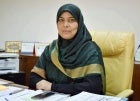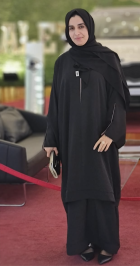Breadcrumb
Stories
Topic
- Show all (2507)
- Political empowerment (-) (17)
- New media (-) (1)
- Parliamentary development (-) (1)
- Gender equality and women’s empowerment (296)
- Economic empowerment (224)
- Peace and security (150)
- Ending violence against women and girls (149)
- Humanitarian action (99)
- Entrepreneurship (87)
- COVID-19 (67)
- Leadership and political participation (63)
- Conflict, war (61)
- Employment (59)
- Peacebuilding (53)
- Human rights (51)
- Health (50)
- Crisis response and recovery (47)
- Women’s rights (44)
- 2030 Agenda for Sustainable Development (43)
- Youth (41)
- Climate change (39)
- Sustainable Development Goals (SDGs) (37)
- Financing for gender equality (30)
- Innovation and technology (29)
- Executive Director (26)
- Peace processes (25)
- Domestic violence/interpersonal violence (22)
- Education (22)
- Partnerships (22)
- Beijing Platform for Action (20)
- Gender equality and inequality (19)
- Commission on the Status of Women (18)
- Financial resources (18)
- Peacekeeping (17)
- Science and technology for development (17)
- Access to justice and legal protection (16)
- Anti-violence interventions (16)
- Communications and media (15)
- Civil society (14)
- Gender, culture and society (14)
- Governance and national planning (14)
- Intergovernmental processes (14)
- Men and boys (masculinity) (14)
- Women with disabilities (14)
- Generation Equality (13)
- Gender stereotypes (11)
- Care and support services (10)
- Civil society participation (10)
- Environmental protection (10)
- Information and communications technology (ICT) (10)
- UN Security Council resolution 1325 (10)
- UN Women administration (10)
- Capacity development (9)
- Migration (9)
- Poverty (9)
- Sexual violence in conflict (9)
- Training (9)
- Decision-making (8)
- Financial and economic crisis (8)
- Social protection (8)
- Unpaid work (8)
- Access to basic services (7)
- Food security (7)
- Gender-responsive budgeting (7)
- Gender discrimination (7)
- Gender wage gap (7)
- Governance (7)
- HeForShe (7)
- Post-conflict recovery (7)
- Sports (7)
- Access to justice post-conflict (6)
- Gender power relations (6)
- Rural women (6)
- Sexual harassment (6)
- Campaigns (5)
- Energy (5)
- Green economy (5)
- Laws, legislation (5)
- Markets (5)
- Media leadership (5)
- Mediation and conflict resolution (5)
- Rape/sexual assault (5)
- Constitutions and legal reform (4)
- Convention on the Elimination of All Forms of Discrimination against Women (CEDAW) (4)
- Coordination, knowledge management (4)
- Electoral systems and processes (4)
- Gender data production and collection (4)
- Health care services (4)
- Safe Cities and Safe Public Spaces (4)
- Violent extremism and terrorism (4)
- Children’s rights (3)
- Citizen engagement (3)
- Fund for Gender Equality (3)
- Harmful practices (3)
- Legal assistance (3)
- Migrant workers (3)
- Millennium Development Goals (MDGs) (3)
- Prevention (3)
- Shelters (3)
- Truth and reconciliation (3)
- UNiTE campaign (3)
- UN Security Council resolutions (3)
- Women farmers (3)
- Adolescents (2)
- Deputy Executive Director, Intergovernmental Support and Strategic Partnerships (2)
- Girls (2)
- Government contributors (2)
- HIV and AIDS (2)
- Human rights–based approach (2)
- Literacy (2)
- Living conditions (2)
- Productive resources (2)
- Sexual and reproductive health and rights (2)
- Trafficking/sexual exploitation (2)
- Trust funds (2)
- UN system coordination (2)
- Ageing/older people (1)
- Anita Bhatia, Deputy Executive Director for UN Coordination, Partnerships, Resources and Sustainability (1)
- Åsa Regnér, Deputy Executive Director for Policy, Programme, Civil Society and Intergovernmental Support (1)
- Businesses and foundations (1)
- Child marriage (1)
- Deputy Executive Director, Policy and Programme (1)
- Disaster risk reduction (1)
- Ending impunity (1)
- Executive Board (1)
- Gender mainstreaming (1)
- Gender statistics (1)
- Human and financial resources (1)
- Indigenous women (1)
- Land and property (1)
- Lesbian, gay, bisexual, transgender, intersex (LGBT) rights (1)
- Local development (1)
- Monitoring and evaluation (1)
- Political violence (1)
- Primary prevention (1)
- Rights in marriage (1)
- Schooling (1)
- Service delivery (1)
- Temporary special measures, affirmative action (1)
- Treatment (1)
- Waste management (1)
- Water (1)
- Women’s movements (1)
1 - 18 of 18 Results
Date:
This call for proposals, announced in the framework of the project Advancing Syrian Women's Participation in the Political Process at all levels is co-funded by the European Union, the Republic of Finland and the Kingdom of Norway...
Date:
More people than ever will go to polls in 2024, when 113 countries have never had a woman at the helm, and only 26 countries are led by a woman today.
Call for Proposals for Civil Society Organizations on Women Political participation – Lebanon Office
Date:
UN Women Lebanon Office welcomes proposals for partnerships to achieve results under its Women’s Political Participation Programme, with a specific focus to increase women's participation in and impact on decision-making in political and civic spaces.
Date:
Hwaida Turk, PhD, is the first woman interim Mohafez (governor) in Lebanon. She was appointed on 17 July 2023 to the southern Governorate of Nabatieh.
Call for Proposals for Civil Society Organizations on Women Political participation – Lebanon Office
Date:
UN Women Lebanon Office welcomes proposals for partnerships to achieve results under its Women’s Political Participation Programme, with a specific focus to increase women's participation in and impact on decision-making in political and civic spaces.
Date:
UN Women is looking for partnerships with an NGO to advance the Gender Equality and Women Empowerment (GEWE) agenda by supporting governmental partners (Including ministries), CSO’s and women Leaders in their efforts to implement the WPP and WPS agenda.
Date:
UN Women plans to engage a Responsible Party as defined in accordance with these documents. UN Women now invites sealed proposals from qualified proponents to provide the requirements as defined in the UN Women Terms of Reference.
Date:
After completing her postgraduate studies in international business, Hania Boukhrais returned to her home city of Sirte, Libya – on the Gulf of Sirte, between Tripoli and Benghazi -in 2010.
Date:
In the midst of a fragile political situation in Libya, where the simple tenets of governance are challenged by widespread insecurity, Halima Al Moghrabi—a young woman with a Masters’ degree in planning-- decided to become an active member in her local municipal council in the port city of Sidra.
Date:
Women’s representation in political decision-making continues to increase but at a dragging pace, with three-quarters of parliamentary seats still held by men, according to new data presented in the 2020 edition of the IPU UN Women map of Women in Politics. The data’s publication coincides with the 25-year review of the implementation of the Beijing Platform for Action, which remains the world’s most comprehensive agenda for gender equality.
Date:
Rajaa Altalli was 12 years old when her father was arrested by the Syrian government for being part of a political party. She thought she would never be involved in public life, but as the Syrian revolution erupted, she decided otherwise. Altalli is now a member of the Syrian Women’s Advisory Board (WAB), established by the UN Special Envoy for Syria to ensure that women’s perspectives and leadership is taken into account in the peace process.
Date:
Tanya Gilly Khailany, from Iraqi-Kurdistan, is a former member of the Iraqi Parliament (2006 – 2010) and a co-founder of the SEED Foundation, an organization that works with survivors of violence and trafficking in Iraq. An outspoken women’s rights activist, Ms. Gilly Khailany was one of the key parliamentarians who legislated the 25 per cent quota for women in Iraqi provincial councils.
Date:
Seven years after the 2011 Revolution and four years after the adoption of the Constitution, women now make up 47 per cent of the local council positions in Tunisia following the May 2018 elections. The dramatic increase in women members is the result of a 2016 electoral law that includes the principles of parity and alternation between men and women on candidate lists for all elections.
Date:
Wedged between prolonged conflict on both its northern and southern borders with Syria and Israel, respectively, Lebanon has endured immense stress over the past several decades. Presently, Lebanon hosts the highest number of refugees per capita in the world, and the country is still reeling from the effects of an internal armed conflict that dates to the 1970s. Recognizing that women and girls are differently impacted by conflict and the critical role they play in building and sustaining peace, in 2017 the Council of Ministers tasked the National Commission for Lebanese Women (NCLW), to develop Lebanon’s first National Action Plan (NAP) to implement the UN Security Council Resolution 1325 on women, peace and security.
Date:
In its highly anticipated parliamentary election in almost ten years, Lebanon saw a record number of women on the ballot. An unprecedented 113 women registered as candidates, and 86 of them made it to candidate lists.
Date:
Mehrezia Maïza Labidi chaired many of the plenary sessions that led to the birth of Tunisia’s new constitution, which includes a clause guaranteeing women’s rights. A vocal advocate for young women's participation and leadership in politics, she took part in the High-Level Women Leaders’ Forum for Africa’s Transformation and the launch of the African Women Leaders’ Network.
Date:
For men in Egypt and in many other countries in the Middle East, there is a peculiar taboo of not disclosing one's mother’s name in public, to prevent her name from becoming the subject of shame and ridicule. Over time, she’s only referred to as ‘The mother of her eldest son’.
Date:
Following the revolution and months of protests starting in 2011, Tunisia’s Constituent Assembly adopted a new Constitution on 26 January 2014, considered a harbinger of change for gender equality in the Arab States.
1 - 18 of 18 Results












